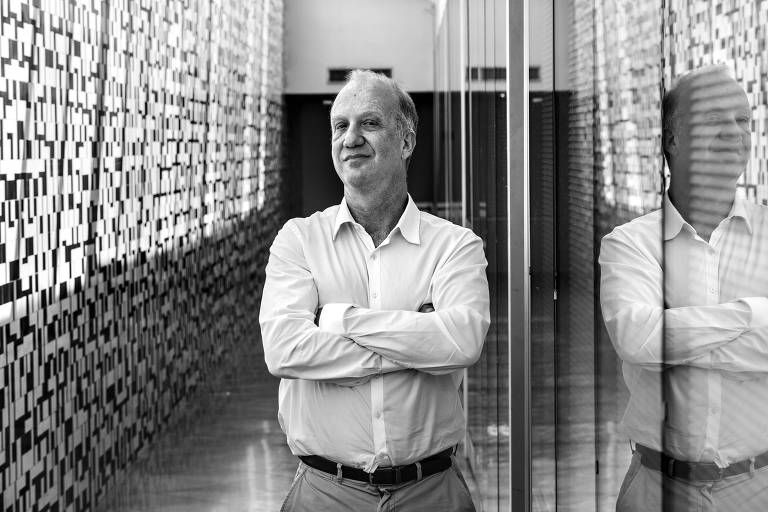Marcelo Neri
If Brazil doesn"t focus on the poorest with targeted programs such as Bolsa Família, the country may take 15 years to return to the same level of poverty as before the crisis, says economist Marcelo Neri, dean of FGV Social.

PhD in Economics from Princeton University, master in Economics from PUC-Rio, Marcelo Neri is the dean of FGV Social and founder of FGV"s Center for Social Policies - Lalo de Almeida/Folhapress
How do you assess the evolution of income and inequality in Brazil?
Brazil was following a process of inclusive growth until 2014, but that process has been reversed since then. Incomes have fallen and labour income inequality increased for four consecutive years, something that hadn"t taken place even in 1989, when we attained our record level of inequality.
As a result the economy has slowed further, since the poor tend to spend most of their income on consumption.
Poverty has also risen greatly. Between 1990 and 2014 the poverty level had fallen around 75 per cent. Now extreme poverty alone has risen 40 per cent. A combination of falling incomes, unemployment and rising inequality has brought about this reversal.
Fortunately we"re not returning to the same level of poverty as before poverty decreased. But projections show that if we"re not able to reduce inequality, even with 2.5 per cent yearly growth until 2030 we will only manage to return to where we were in 2014.
In other words, not only must we fight inequality, we must fight its worst form - inequality that affects especially the poorest. This is something that programs such as Bolsa Família and state schools are able to do.
Who has won and who has lost the most?
Unlike the previous period, when inequality fell and excluded groups were able to make greater gains, it"s been a mixed bag. The worst affected have been young people, who lost 15 per cent of their income during the crisis, while the average Brazilian lost only 2.6 per cent, since first there was a fall and then average income recovered somewhat.
Black people and those with little schooling have been the worst hit. The loss of income has also been worse in the North and Northeast regions. Women have secured a few gains, while men have lost, so gender inequality has shrunk somewhat.
The only group that has gained have been spouses, as a strategy for maintaining family income.
The last few years have also seen improvements for those with more schooling, and since women are more educated, they have managed to stand out.
But it has been a period of inequality in the labour market, which in the previous period had also been the major cause of lessened inequality.
How does inequality impact Brazil"s GDP?
Inequality and the growth of inequality tend to negatively affect growth in several ways, with decreased consumption, violence that disrupts productive activities and political polarization leading to instability. All this is bad for the country.
We may have seen some level of recovery of the average income, but in terms of the welfare of the nation, which also takes income distribution into account, there has been virtually no recovery. A very slight recovery, at best.
It has been a lost decade in terms of social welfare.
During the commodities boom of the 2000s, income increased and inequality shrank. If we have a new favourable cycle, could this be resumed or have things changed due to the aging population?
I think we will need very clear action around inequality and the type of inequality we want to reduce. If the idea is to reduce inequality at the average level of income distribution, there are no resources for it.
If we decide to focus on the poorest of the poor, we may achieve something. But if we rely solely on growth, we will have to wait 15 years to get back to where we were at the start of the crisis.
Inequality needs to be fought directly. But the main problem could be that we have lost this perception, this goal.
Besides the effects of the crisis, we used to have the aim of fighting inequality. But we have left this middle-ground path and have become polarized. Either people look for growth alone or, as is the case of the traditional political left, they focus entirely on inequality.
We need to reconcile these views, because if we look to the social advances Brazil has made, they have not been limited to income growth and poverty reduction post-1990.
Life expectancy increased, and the level of education, which had always been stagnant, also improved. But these changes had no impacts on the economy.
People are living longer, but we haven"t reformed our pensions system. Brazilians" level of schooling has improved, but there has been no rise in worker productivity.
People"s standard of living improved, but there was no upward movement of economic responsibility to support it.
And now we"re witnessing a social regression. Life expectancy and the infant mortality rate have begun to worsen.
The lack of macroeconomic results has begun to affect social conditions.
Incomes rose and inequality fell during a period in which the monthly minimum wage rose 74 per cent above the inflation of the previous 15 years. Was that a good policy?
We had a strong policy, but which may have been exaggerated, not only in view of the high level of current unemployment, but also of public resources transfers.
People imagine that increasing the minimum wage is the best way to fight poverty. But in truth it has a high cost because all social policies, pensions, unemployment benefits and salary bonuses, for instance, are indexed to the minimum wage.
When you increase public spending while the population is aging, it"s an unsustainable process.
In the 1990s, when the Fernando Henrique Cardoso administration bumped up the minimum wage considerably, it had an impact on poverty. And it had to be done, since there was no Bolsa Família at the time. Now we have other tools at our disposal, but even so we kind of scattered cash out of a helicopter, so to speak. We spent on welfare and pensions, on the poor and those who were not poor, on national champions.
Brazil adopted an economic strategy that was unsustainable. This ended up putting at risk the very resources needed to fight poverty with. If we want to do the same thing now it will have to be a very determined and focussed effort.
The tool we have perfected is Bolsa Família. Should this be our starting point?
That should be our starting point, as well as dismantling things that aren"t working equally well. Because in this country we have this tradition of implementing more and more programs and stuff and at the same time maintaining other programs, even those that aren"t working well.
Another thing needed is to create connections between the programs. Where does a person go when they exit Bolsa Família? To a formal job? Do they try to become an entrepreneur? We need to think of integrating things.
Brazilian social policy is highly compartmentalized. Bolsa Família is a good example of a starting point from which you can connect other programs for other groups.
After 13 years being governed by the PT, we had impeachment, the Temer government and then the victory of the right wing with Jair Bolsonaro. Is that related in any way to the increase in inequality?
Brazil" social indicators were somewhat disconnected from the economic reality. Our GDP began going sideways since the start of the decade, while the labour market and income distribution continued to thrive until 2014.
But from the psycho-social perspective, society"s confidence in the federal government and our institutions and how it saw public policies have been deteriorating since 2010.
I think at present it is very hard to try and understand Brazil without listening to what Brazilians have to say. We need to look beyond the objective indicators.
We try to find some reassurance in the global scene. We have [Donald] Trump, in the UK there"s Brexit, and what took place in Brazil is part of the same context. True, but Brazilians have a much greater distrust in their institutions.
Regarding public approval of political leaders before the 2018 elections, it"s not that Brazil has the worst rating in the world. It"s the worst rating in a ten-year historical series. In the entire historical series we have observed, no other country has had such a sky-high level of public disapproval of their politicians.
This was reflected in the elections. There are social and objective reasons, such as unemployment and inequality, for what took place, but there is also a much deeper psychological root.
How do you evaluate inequality on the global level?
The straitened resources of the traditional middle classes in the developed countries are an important symbolic factor which may explain phenomena such as Trump and Brexit. Except that if we look at global
inequality and income distribution, they have improved over the last few years due to the economic miracles of China and India, two countries that held half of the world"s poor.
And this despite inequality having grown within these countries and in the rich nations.
The traditional middle class is the group that has been losing out in the wealthy nations, and its members end up voting on the basis of what they can see, which is their country. And this has been worsening the world over.
Economic polarization has also led to a polarization of ideas, with societies increasingly divided. There"s a lot of "us versus them" and vice-versa.
This leads people to come together at the extremes, around causes that reinforce themselves, leading to deepening conflicts.
Why does Brazil have such a great income concentration at the top 1 per cent?
Because we were the last Western country to abolish slavery, there"s deep inequality in our labour relations. The income level of the 1 per cent wealthiest has remained this high not only due to capital yields, but because of labour income.
The importance of the company you work for, of your access to productive capital, is even greater for inequality than the level of education passed on from parents to children.
The Income Tax data I studied with Marcos Hecksher, from IPEA, also point to the privileges enjoyed by a caste of working civil servants. Not to mention the civil servants pensions scheme, that intensifies inequality at the top level.
But we should point out that although the Global Inequality Report numbers reveal a very high level of income concentration at the top, they also indicate a country that has become much more prosperous, not only in the present snapshot but also over time.
Brazil"s average income growth rate over the last eight years in the series was six times higher than GDP growth rate. In other words, although the new numbers do bring us bad news, they also bring good news to careful observers.
Translated from the Portuguese by Clara Allain

